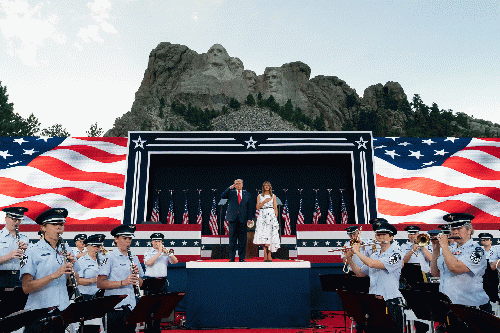From Consortium News

President Donald J. Trump and First Lady Melania Trump, July 3, 2020, Mount Rushmore National Memorial in Keystone, S.D.
(Image by (White House, Tia Dufour)) Details DMCA
The signs of America's decline are ubiquitous now such that the phenomenon is no longer worthy of debate.
China, Japan, South Korea; Italy, Spain, Germany, the Danes and Norwegians Asia and Europe all gain control of the COVID-19 pandemic even as the U.S., by the newest numbers, is back where it was during the worst of it last spring.
This is systemic failure next to systemic success, plain and simple.
We face a leadership failure, too again, as others do not. President Donald Trump was not wrong, during his Mount Rushmore speech last Friday, to note the frightening illiberality of American liberals. But there was something disturbingly Mussolini-esque in his language, his gestures, his defiance of reality altogether the portentous dynamic one saw between an ignorant figurehead and a crowd embracing his ignorance as its own.
"The worst are full of passionate intensity," Yeats wrote in "The Second Coming," and the worst are either running our republic or propose to run it. Things fall apart: We are collectively responsible for this.
Bitter as our national circumstances are at this moment, let us not miss the larger reality of which they are expressions. Read properly, America's decline is a subset of the decline of the West. The phrase is Oswald Spengler's, of course the title of a two-volume work he published a century ago. If the German historian got as much wrong as right, he was spot-on in identifying our Western-centric understanding of history as a Faustian fallacy that would eventually bite us on the backside.
We are now living through the epochal turn Spengler's thesis implied. All that befalls us and all our leaders do our failed response to the Covid-19 crisis, the collapse of our political institutions, the exposure of our papered-over past, our ever-more-aggressive conduct abroad is best understood as a function of this historic moment.
The West's superiority over the non-West has been a given in the Atlantic world for half a millennium. I take my date from Vasco da Gama's landing at Calicut, on India's Malabar Coast, in 1498. From the Portuguese explorer's first steps in the East and ever since, this presumption has rested primarily on the West's material preeminence.
Systems of governance, social norms, individual liberties -- the East was considered inferior in all such matters. But it was science, technology and industry that mattered most: From these the West derived its power and claimed its right to imperial dominion. Dieu et mon droit, remember?
This claim to historically ordained superiority evaporates as we speak. So is this, our Spenglerian moment. It has been a long moment, let's say, unfolding for some time. But the COVIDÂ -19 crisis hastens it and brings it into painfully sharp relief.
21st Century Imperative
Parity between West and non-West is a 21st century imperative, a human destiny no nation can hope to prevent.
Your columnist has argued this (and applauded it) since the Cold War's end. A wise and imaginative world power would not merely accept this turn of history's wheel: It would embrace it, recognizing the immense advantage in having more voices from more perspectives address themselves to humanity's common problems and tasks.
(Note: You can view every article as one long page if you sign up as an Advocate Member, or higher).





